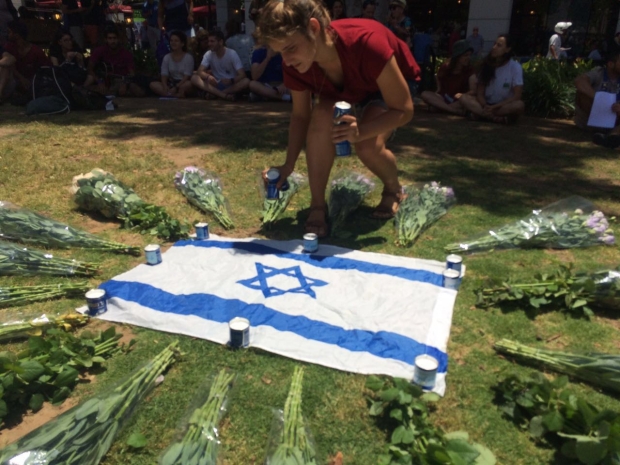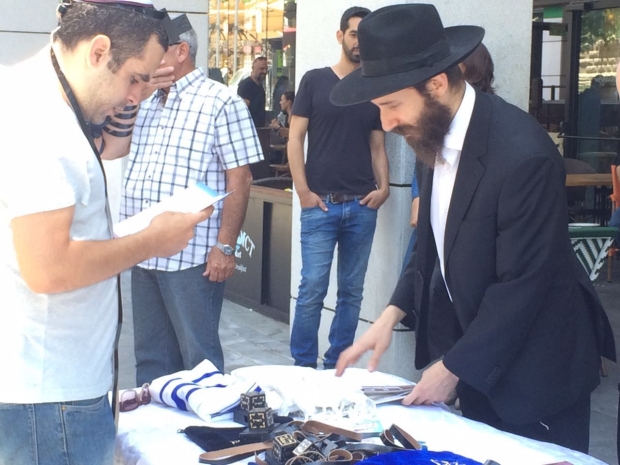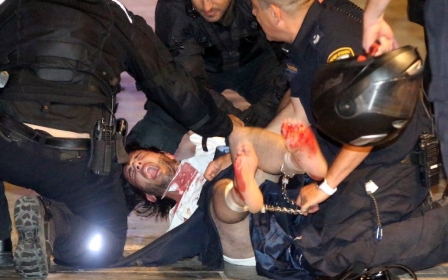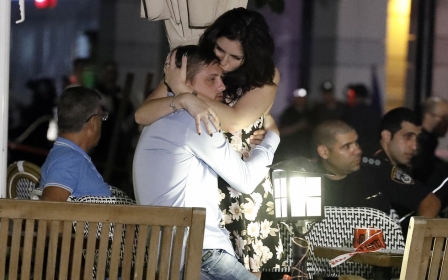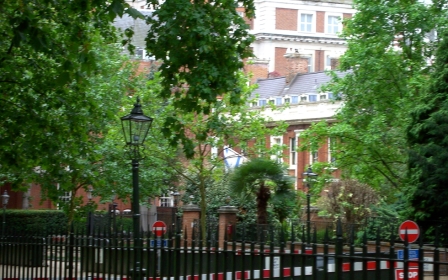Grief, solidarity in shocked Tel Aviv after deadly cafe attack
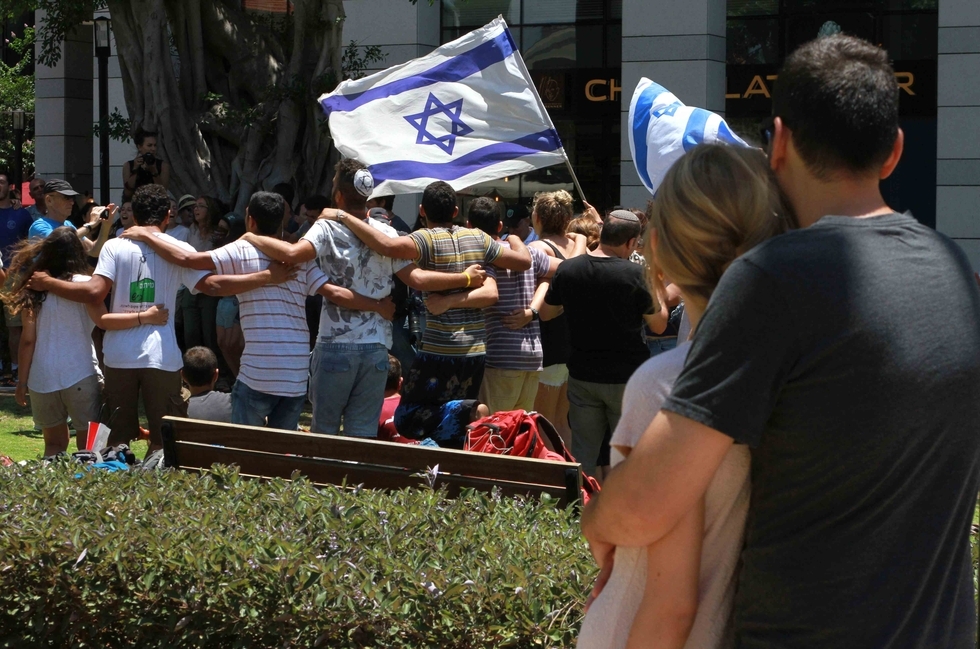
TEL AVIV – On Thursday morning, 75-year-old Yael sat in front of a cafe in the Sarona Market where on Wednesday evening two Palestinian gunmen opened fire indiscriminately and killed four Israeli revellers.
With tears filling her eyes, Yael told Middle East Eye that she had taken the day off work as a caregiver to pay respects to the four murdered Israelis identified by police as Ido Ben Aryeh, 42, Ilana Nave, 39, Michael Feige, 58, and Mila Mishayev, 32.
“I live nearby, and I didn’t know what else I can do other than just come here and cry with the people who witnessed last night’s atrocities,” she said.
Security camera footage released online showed revellers fleeing the scene in panic after Palestinian cousins Khaled Mohammad Makhamrah, 22, and Mohammad Ahmad Makhamrah, 21, brandished their weapons and shot people enjoying an evening meal.
On Thursday, the cafe remained open and its tables were filled with people who wanted to show solidarity with the victims.
Office worker Tal, 24, who works across the street, decided to come to the cafe with a group of friends and sat at a long table with pancake-stacked plates as she told of the horror of the previous evening’s events.
She was on her way to have a beer with colleagues in the area after finishing work when she saw people running away in panic.
“I ran back to the office and we locked ourselves in until 11pm, while two of my colleagues ran to the site to help the injured," she told MEE over a cup of espresso.
“So we decided to come here this morning, thinking this is the patriotic thing to do, knowing that we cannot let life stop because of what happened.”
The manager of the cafe, who did not want to be identified, said it was a “good surprise” to see people showing up to express their solidarity.
“I told all my employees they could go home, so seeing customers here is a good surprise,” he said, laughing.
Next to the cafe a group of 19-year-olds were gathered with a guitar and memorial candles. They were part of a pre-military programme known as Mechina, which seeks to prepare them for their conscription and encourages them to go on to combat units and become Israeli army officers.
They were on a trip to northern Israel when the attack occurred, but decided to divert and come to Tel Aviv instead.
“Tel Aviv is always at the centre, it’s a symbol and it seems like the media covers an attack that happens here more extensively than if it would have happened in other places,” said Gaya, the 22-year-old programme instructor.
“Growing up in Israel, you become apathetic to these events, so we wanted to make sure we all stop and let it sink in for a moment.”
The youngsters formed a big circle, and sang Am Yisrael Chai (The Israeli People Live On) and handed out stickers that said “Tel Aviv is not apathetic” – in an attempt to refute the city’s reputation as being a “bubble” unaffected by violence.
The coastal city has a reputation for being left-leaning and, in a country where right-wing politics dominate, there has been some push-back against the city’s residents after the attack.
Some social media users posted after the attack that they were happy it had taken place in Tel Aviv, suggesting it might teach the city about the cost of violence, despite the fact that many deadly attacks have already taken place there.
On Facebook, some right-wing Israelis posted comments saying their fellow countrymen who were killed on Wednesday evening “deserved it because they are f*****g leftists".
Across from the group of soon-to-be army conscripts, a group of religious Jews asked passers-by to perform the Jewish custom of donning the Tefilin (small black leather boxes containing parchment inscribed with verses from the Torah) in memory of the previous night’s events.
“People were murdered here simply because of their religion and so we came to encourage people to strengthen their Jewish identity and endorse their religion,” said Yechezkel of the Chabad Hasidi movement.
When asked if he thought the attack happened because of political circumstances rather than just religious ones, he responded: “Our ownership of the land of Israel was commanded by the Torah, and it is the source of our right to hold it and sets our relationship to the men, or rather beasts, who attacked us.”
Throughout the day, Israeli politicians flocked to the Sarona Market, including Defence Minister Avigdor Lieberman, Education Minister Naftali Bennett and opposition leader Isaac Herzog.
Before Israel’s security cabinet was due to meet and discuss a response to the attack, Lieberman released a statement that said: “Life in the Yatta village won’t carry on as usual. A village that has terrorists leaving from its midst will pay the price.”
The two cousins who carried out Wednesday’s shooting were reported to be from Yatta village, which is close to Hebron in the southern occupied West Bank. Lieberman has also now announced that the bodies of any Palestinian attackers will not be returned to their families, a move authorities hope will discourage people from carrying out future attacks.
On Thursday, hundreds of extra Israeli soldiers poured into the West Bank as Yatta was placed on lockdown, with army vehicles blocking all access points and soldiers searching all those entering and leaving.
Lieberman’s recent appointment as defence minister came as part of a deal that saw his Yisrael Beiteinu party join a coalition government led by Prime Minister Benjamin Netanyahu that has been described as the most right-wing administration in Israel's history.
The new defence minister has previously called for “disloyal” Israeli-Palestinian citizens to be beheaded; his appointment has only deepened a widespread perception that an end to the conflict is nowhere in sight.
But for 75-year-old Yael, who came to the cafe to grieve for the victims, Lieberman's appointment represented a move away from stagnation – even if it might herald more violence.
“Years go by and nothing changes. I’ve witnessed the same political circumstances my whole life and therefore I don’t have much hope for the future,” she mumbled as she wiped away a tear.
“Looking at Lieberman, I see someone bold who might be harsher and move us towards a new direction, and a new direction is the only hope I have.”
New MEE newsletter: Jerusalem Dispatch
Sign up to get the latest insights and analysis on Israel-Palestine, alongside Turkey Unpacked and other MEE newsletters
Middle East Eye delivers independent and unrivalled coverage and analysis of the Middle East, North Africa and beyond. To learn more about republishing this content and the associated fees, please fill out this form. More about MEE can be found here.


